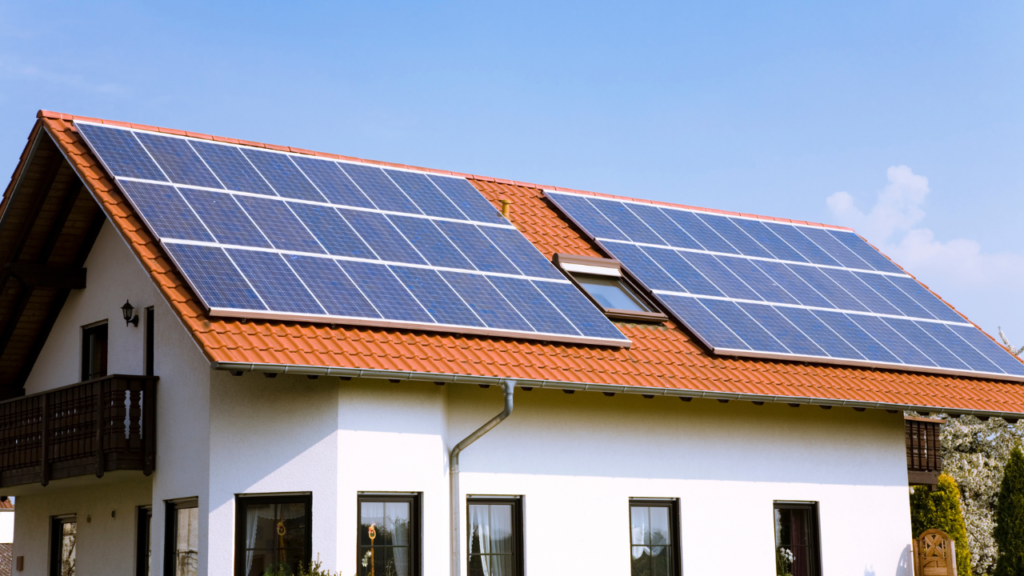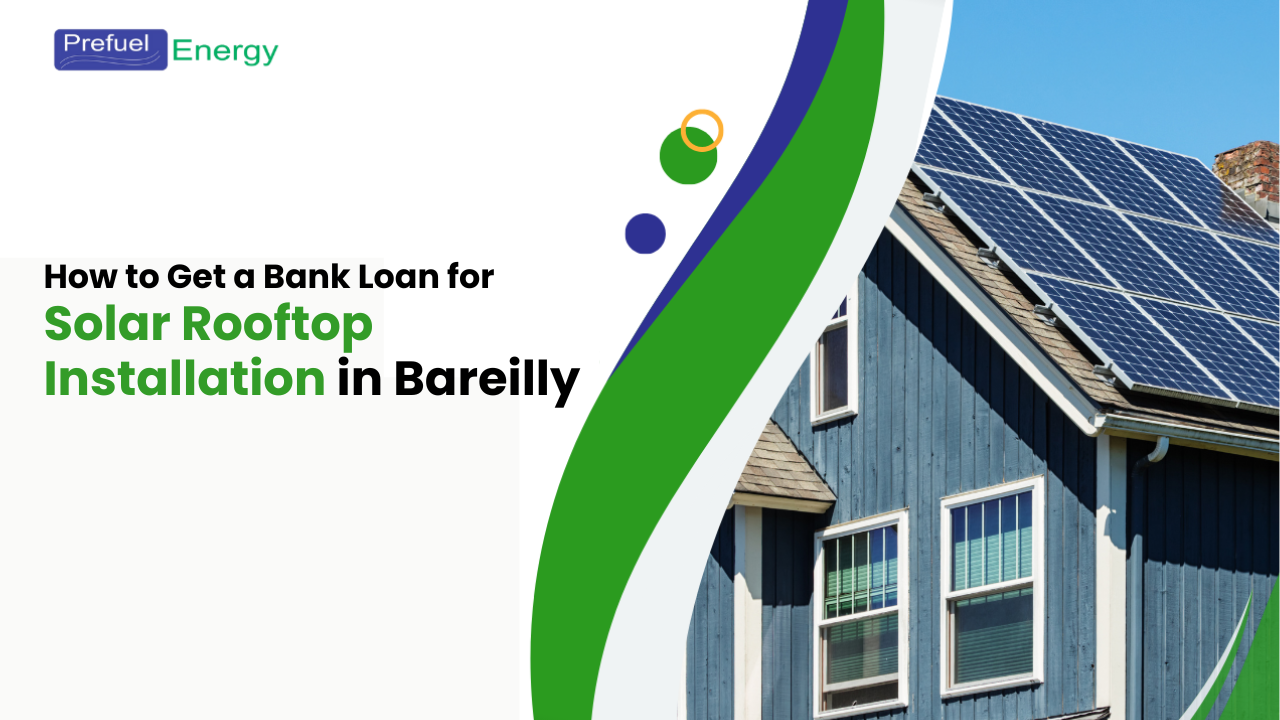Are you considering installing a solar rooftop system in Bareilly but worried about the upfront costs? You’re not alone. Many homeowners are eager to embrace clean energy but find the initial investment challenging. That’s where bank loan for Solar Rooftop Installation in Bareilly.
In this guide, we’ll walk you through everything you need to know about securing financing for your solar project in Bareilly. From eligibility criteria and required documents to the application process and tips for getting the best deal, we’ve got you covered.
Whether you’re looking at options from SBI, Bank of Baroda, or other leading lenders, this article will help you navigate the world of solar rooftop loans with confidence. Let’s shed some light on how you can make your solar dreams a reality!
Table of Contents
Understanding Solar Rooftop Loans
What is a Solar Rooftop Loan?
A solar rooftop loan is specifically designed to help homeowners finance the installation of solar power systems on their rooftops. These loans make solar energy more accessible by allowing homeowners to pay for the system over time, rather than upfront. The primary purpose is to promote the adoption of renewable energy while providing financial flexibility to homeowners.
Benefits of Choosing a Loan Over Other Financing Options:
- Lower Upfront Costs: Solar rooftop loans often require little to no down payment, making it easier for homeowners to start their solar journey.
- Immediate Savings: By financing through a loan, homeowners can benefit from reduced electricity bills right away, as the savings from solar energy can offset monthly loan payments.
- Tax Incentives: Homeowners retain ownership of the solar panels, which allows them to take advantage of tax credits, such as the federal solar tax credit.
- Flexible Terms: Many loans offer flexible repayment options, ranging from 5 to 25 years, allowing borrowers to choose a plan that fits their financial situation.

Types of Loans Available
In India, various banks and financial institutions offer solar rooftop loans with differing terms and conditions. Here’s an overview:
| Bank | Maximum Loan Amount | Interest Rate | Repayment Period |
|---|---|---|---|
| SBI | Up to ₹10 Lakhs | 7% – 9% | Up to 5 years |
| Bank of Baroda | Up to ₹6 Lakhs | 8% – 10% | Up to 7 years |
| HDFC | Up to ₹3 Crores | 8.5% – 10.5% | Up to 20 years |
| PNB | Up to ₹6 Lakhs | Floating rate starting at 7% | Varies by income |
| Electronica Finance | Up to ₹3 Crores | Competitive rates | Up to 4 years |
Comparison of Loan Terms and Interest Rates
When considering solar rooftop loans, it’s essential for homeowners to compare the terms and interest rates offered by different banks. Here are some key factors:
- Interest Rates: Most banks offer competitive rates starting around 7% p.a., but this can vary based on the loan amount and repayment period.
- Repayment Terms: Generally range from 4 to 20 years, allowing borrowers flexibility in managing their monthly payments.
- Loan Amounts: Depending on the lender, amounts can vary significantly; some offer up to ₹10 Lakhs while others may provide higher limits for larger installations.
By evaluating these factors, homeowners can select a loan that aligns with their financial situation and sustainability goals
Eligibility Criteria for Solar Rooftop Loans

General Eligibility Requirements
When applying for a solar rooftop loan, applicants generally need to meet the following criteria:
- Nationality: Must be an Indian citizen.
- Age: Typically between 21 to 70 years, depending on the bank’s policy.
- CIBIL Score: A minimum score of 650 to 750 is usually required, varying by lender.
- Property Ownership: Applicants must own the property where the solar system will be installed and have rooftop rights.
- Sufficient Roof Area: The property must have adequate space for the installation of solar panels as per guidelines from the Ministry of New and Renewable Energy (MNRE).
- Electricity Bill: A recent electricity bill in the applicant’s name is often required to confirm ownership and usage.
- Income Verification: Some banks may require proof of income, such as income tax returns or salary slips, especially for larger loan amounts.
Specific Bank Requirements
State Bank of India (SBI)
- CIBIL Score: Minimum of 680.
- Age Limit: Up to 65 years (loan must be closed before reaching 70).
- Loan Amount: Up to ₹6 lakhs for installations over 3 kW.
- Income Requirement: No specific income requirement for installations up to 3 kW; a minimum annual income of ₹3 lakhs is needed for higher capacities.
HDFC Bank
- CIBIL Score: Minimum score of 750 required.
- Age Limit: Generally between 22 and 62 years.
- Loan Amount: Maximum up to ₹6 lakhs based on project capacity.
- Income Requirement: Minimum annual income of ₹3 lakhs for loans above a certain threshold.
Bank of Baroda
- CIBIL Score: Minimum score of 680.
- Age Limit: Between 21 and 70 years.
- Loan Amount: Up to ₹2 lakhs for installations up to 3 kW and up to ₹6 lakhs for installations between 3 kW and 10 kW.
- Income Requirement: Minimum annual income requirement of ₹3 lakhs for loans over 3 kW.
Additional Considerations
- Processing Fees: Some banks may charge processing fees, while others may offer loans with no fees.
- Moratorium Period: Typically, a moratorium period of up to six months may be available before repayment begins.
- Subsidies: Various subsidies are available from the government, which can reduce the overall loan burden. These must be claimed by the borrower after installation.
This structured overview provides a clear understanding of the eligibility criteria across major banks for solar rooftop loans, facilitating informed decision-making for potential applicants.
Apply Now For Solar Rooftop Installation in Bareilly
Steps to Apply for a Bank Loan
Applying for a bank loan to install a solar rooftop system in Bareilly involves several key steps. Below is a structured guide to help you navigate the process effectively.
1. Determine Your Eligibility
- Capacity Requirement: Ensure you have sufficient roof space and rights to install a solar system. Loans are typically available for systems up to 10 kW.
- Income Criteria: For installations above 3 kW, a minimum net annual income of ₹3 lakhs is often required.
2. Choose the Right Bank and Loan Scheme
- SBI Surya Ghar Scheme: Offers loans for up to 3 kW capacity at an interest rate of 7% p.a. with no processing fees.
- Union Bank of India: Provides loans up to ₹2 lakhs for systems up to 3 kW, with a margin requirement of 10%.
- Documentation Requirements: Generally, you will need an electricity bill, ID proof, and possibly income documents if your installation exceeds 3 kW capacity.
3. Register on the National Portal
- Visit the National Portal for Rooftop Solar and complete your registration. This step is crucial as it facilitates the subsidy application process.
4. Apply for the Loan
- After registration, apply for the loan through the bank’s website or directly through the National Portal. Make sure to select the appropriate scheme based on your capacity needs.

5. Submit Required Documents
- Prepare and submit all necessary documents:
- For loans up to 3 kW: Electricity bill and KYC documents (address proof and identification).
- For loans above 3 kW: Additional income documentation may be required (e.g., last two years’ income tax returns) along with bank statements
6. Technical Assessment
- The bank or an authorized vendor will conduct a technical feasibility assessment of your rooftop space to confirm that it meets installation standards
7. Approval and Disbursement
- Upon successful verification of your application and documents, the bank will approve your loan. The disbursement is typically made directly to the vendor after all conditions are met.
- Ensure that you provide your loan account number for subsidy credits if applicable.
8. Installation and Monitoring
- Once the loan is disbursed, coordinate with your chosen vendor for installation. Post-installation, ensure that monitoring systems are in place for optimal performance.
9. Claim Subsidies
- After installation, you can claim subsidies directly through the National Portal using your commissioning certificate. The subsidy amount will be credited to your bank account within approximately 30 days of approval.
By following these steps, you can efficiently apply for a bank loan to support your solar rooftop installation in Bareilly, taking advantage of available subsidies and financing options to make solar energy more accessible and affordable.
4. Benefits of Installing a Solar Rooftop
- Environmental Impact
- Reduction in carbon footprint and contribution to sustainable energy.
- Financial Savings
- Long-term savings on electricity bills.
- Increased Property Value
- How solar installations can increase home value.
FAQs About Solar Rooftop Loans
A solar rooftop loan is a financial product designed to assist individuals and businesses in financing the installation of solar panel systems on their rooftops. It allows borrowers to cover the upfront costs associated with purchasing and installing solar panels, which they then repay over time, typically with interest.
Most lenders offer loans that cover between 70% to 100% of the total installation cost. The exact percentage depends on the borrower’s credit profile and the overall project cost
Yes, many governments provide subsidies for solar installations, which can significantly reduce overall costs. These subsidies may allow borrowers to take out smaller loans or enhance their financing options
Many lenders offer prepayment options that allow borrowers to repay their loans early without incurring penalties. This can lead to significant savings on interest payments over time
The repayment period for solar rooftop loans typically ranges from 3 to 10 years. This flexibility allows borrowers to choose a term that best fits their financial situation
Commonly required documents include:
- Proof of identity (e.g., Aadhaar, PAN)
- Proof of income (e.g., salary slips, tax returns)
- Property ownership documents
- Quotations from the solar installation company
- Bank statements and financial records
Conclusion
While PV stations generally produce less noise than other industrial facilities, adherence to regulatory standards is crucial for minimizing their impact on surrounding communities.
By implementing effective noise reduction strategies and complying with local, national, and EU regulations, solar energy projects can operate harmoniously within their environments, supporting both renewable energy goals and community well-being.


